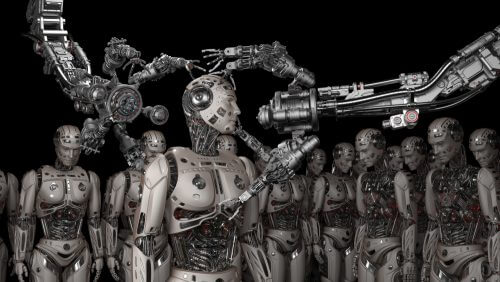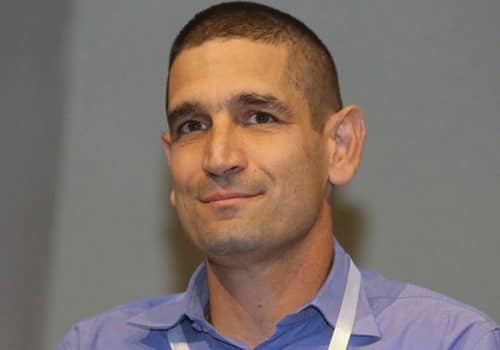This is what Gal Inbar, CEO of iCobots says in a panel at the INDUSTRY 4.0 conference. "There are 150 workers on production floors in Israel, most of whom will retire in the next decade. If we don't find a technological solution for 50 thousand pairs of hands and 50 thousand pairs of legs or even for a hundred thousand of them, we will face a shortage"

"The workers on the production lines are getting old, only robots will be able to replace them", said Gal Inbar, CEO of iCobots at the INDUSTRY 4.0 conference.
The conference, produced by People and Computers, was held last week in Israel. The conference, which was attended by hundreds of professionals from the field, was moderated by Ilan Alter, CEO of Alternet and chairman of the content committee of the conference, and Yehuda Conforts, editor-in-chief of People and Computers.
According to Inbar, "There are 150 workers on production floors in Israel, most of whom will retire in the next decade. If we don't find a technological solution for 50 pairs of hands and 50 pairs of legs or even XNUMX of them, we will face a shortage."
"No one in this room wishes for their children to work and operate machines and there is distress in Israeli industry and technologies. We and the other companies in the field aim to lower the salary of the robotic laborer to three dollars an hour, which is even more attractive than the Chinese laborer."
Advocating evolution, not revolution
Inbar added that "the first to bring this concept were the big companies and they went on huge projects, they talked about a revolution. In practice, I don't know a factory manager who threw away 50% of his factory because a revolution was coming. We advocate evolution, not revolution. We are doing a project in Raphael with Liora Yosef's team (she also participates in the AB panel), they took one unit, we provided in-depth training to their team. We accompany them and they have formed a team between factories, moving from factory to factory and seeing what can be implemented at each site."
"One of the challenges of the IoT is to tear the responsibility away from the engineering and transfer it to the operator. We have learned that smart industry fails if factory engineering or even factory maintenance is responsible for it. If it is possible to let the machine operator manage the smart factory, we have won," he said.
"When Israeli industrialists realize that they can get a grant from the state to implement cobots, we will see them much more in the manufacturing plants. And our children will be cobot managers, not machine operators," concluded Inbar.
Dr. Eyal Kaufman, CEO of QualityLine, spoke at the event about smart production floors. "We collect all the data in the factory and there is a layer of algorithms that analyzes the data in real time, finding the things that require improvement during the production process," he said.
According to him, "Before we founded QualityLine, I worked for 25 years in the manufacturing world. So, for example, I was the CEO of the Mobileye factory. The first thing that factory managers have to deal with is the accumulated information in the production process, which includes intelligence and wisdom about what is happening in the production process."
"Our ability to take this information and use it for the benefit of the insights of what is going well and what may go wrong in the future, these are the most important principles in order to be able to improve the efficiency of the production process," he said.
"When a manager wants to move to Industry 4.0, he turns to the IT and engineering team. The IT people come and tell him 'we have cobots, machines, ERP how can we create a situation of cooperation between all the sources of information in the organization?' The problem is that each of the information producers has its own language. In order not to lose all the old machines, we have to work with what exists today, therefore the ability to find smart solutions so that we can collect and analyze the data accumulated in the production process is the critical part of being able to realize Industry 4.0 in the organization," he added.

"Everyone and their differences, everyone and their complexity"
Liora Yosef, director of the industrial engineering department in Rafael's IT body, said at the event that "Rafael has different types of factories. We have process factories, boutique factories and factories that deal with sensitive materials. We have been dealing with Industry 4.0 for several years. Everything that was talked about here today is implemented and exists here and is developing."
According to her, "We have over ten factories, each with its own variation, each with its own complexity. We carry out big data projects where required, fault analysis with the help of artificial intelligence, augmented reality, everything related to production floor management. The relationship between manufacturing plants and IT is close. We are constantly developing in all these aspects. They talked about autonomous robots, we are also looking into that. Of course we implement cyber security."
"run relatively fast"
Agmon David Porat, CEO of the innovation laboratory for smart industry LET LAB in Hamlet also participated in the event. According to him, "There is a lot of money in the country that is intended for industrial companies that will introduce smart systems. It should be made accessible because not many know. In particular, it is important to emphasize the fundamental change made in the Innovation Authority. We won the Authority's tender and opened LET LAB, a body similar to a greenhouse. A startup that arrives receives funding, free offices, and most importantly - a USE CASE within which they are given a real problem to solve. We also ask for a share in the ownership, but give a playground and help them make the big leap forward."
"Today, among the companies in the incubator there is one augmented reality company to shorten employee training and another company that develops AI that takes data from production. The cooperation mechanism with the start-ups allows our company, which is very slow, to run relatively fast," he added.
The article was first published on the People and Computers website
